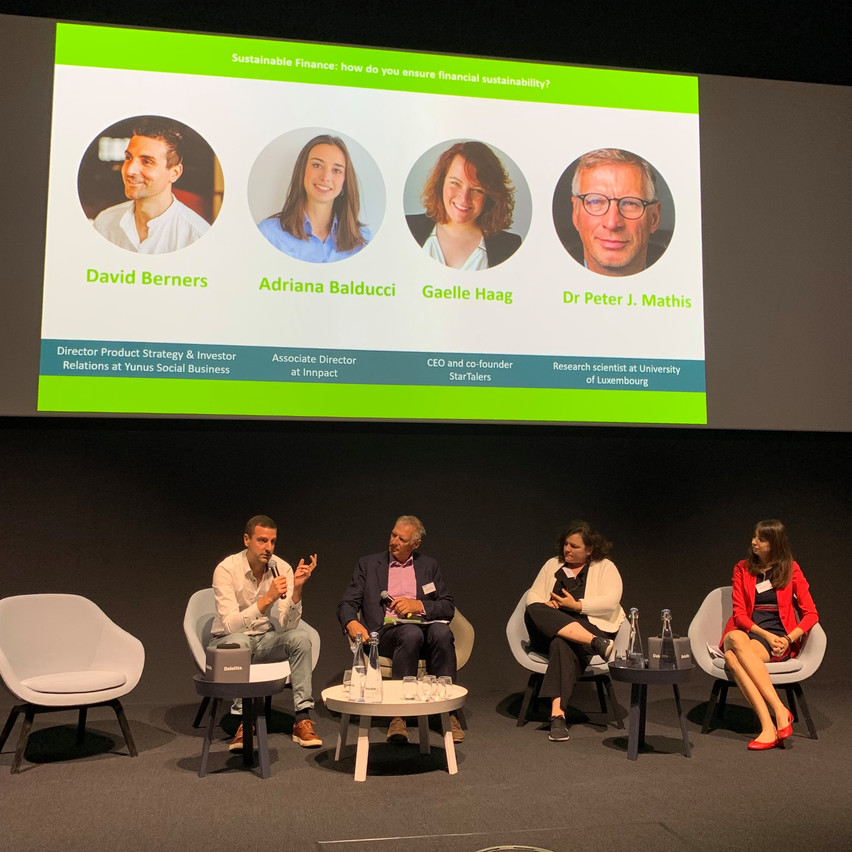Recent blended financing announcements, such as Luxembourg’s , or the European Investment Bank’s €27.6bn in green investments in 2021, both referenced at the conference, require committed private investors to get in, stay in, and to hold the management of the underlying assets to account.
“It’s a drop in the ocean in size and scope,” said David Berners, the director of product strategy and investor relations at social investment fund Yunus Social Business, referencing the estimated additional $2.5trn in private and public financing per year needed globally to meet the UN’s sustainable finance goals.
Gaelle Haag, who co-founded StarTalers, a roboadvisor that supports women willing to invest sustainably, said of private investors: “It’s easy to invest when the markets are going up, but the same investors turn their back when the markets go down. There are some big outflows from ESG funds in current market conditions.”
Blended finance de-risks investment for private capital by strategically taking first-loss positions with public, developmental or philanthropic money. This way, greater volumes of private capital can fly towards lesser-loved investment universes with a more limited downside risk than might otherwise present itself.
Eventually, private investment flourishes to the extent that public participation can be withdrawn all together. But whether the private money remains depends on the private investor, the panelists said.
“There is a difference between investing for impact and investing with impact,” said Berners. “If you invest for impact then your primary need is impact and you do not take out your assets when the market goes down. Investing with impact, on the other hand, is a different story.”
Haag clarifies: “At its most passive, ESG investment is financial investors’ effort to avoid distressed assets in future portfolio.”
Both the Luxembourg state and the Luxembourg-headquartered EIB have recently announced ambitious investments in the field of climate finance. Luxembourg has joined forces with global investment manager Schroders and impact investment specialist BlueOrchard to set up and manage a climate financing vehicle by end of 2022 that will focus on investments that support the transition to carbon-neutral and resilient economies.
The EIB, meanwhile, revealed a €26.7bn contribution in 2021 to green investments, which it defined at Momentum as €9.1bn in lower carbon transport, €5.7bn in renewable energy, €4.7bn in energy efficiency, €4.1bn in other climate change mitigation, €1.6bn in research, development and innovation, €1.3bn in climate change adaptation and €1.1bn in other environmental sustainability financing.
The bank, which uses blended finance among other tools to achieve policy goals, also plans on bolstering its investments in climate change adaption to 15% of its total climate finance by 2025 – a threefold increase from the 2015-2020 period.
Transparency and metrics
EIB senior climate officer Céline Bruhe also underlined the importance of transparency in a presentation given at Momentum.
Some delegates, however, pointed out that transparency alone can’t improve private investment decisions. “I do not believe in an approach fully based on transparency,” said Berners. “The truth is, we are far away from showing data to the investor and trusting them to make the right choice. The challenge is for the asset managers to convince investors and bring investors on board. It’s almost arrogant to think the investor can see the data and make that choice.”
Haag agreed. “Labels don’t tell the right story or they confuse the story. Risk-based metrics are sold as a label for impact or ethics. But socially responsible investing and fossil fuels aren’t mutually exclusive. Rather than boxes with labels, we need to educate investors on how to go beyond that to the raw data and decide for self a sustainable portfolio aligned with own values and objectives.”
For Adriana Balducci, associate director at sustainable investment advisory Innpact, the complex EU framework has some significant drawbacks when it comes to investing in illiquid emerging market products.
“The EU taxonomy can’t easily be applied to emerging market managers. A small business or a microfinance fund in Latin America can’t report its global emissions offsets when there is no data. Even proxy data is often based on listed products so it can’t be applied.”
What is important, Balducci said, is to look beyond the KPIs and into the investment portfolio. “As Plato said, ‘don’t confuse law with ethics.’”
Impact investing
The panelists agreed that impact investors actively invest to make a difference. However, the percentage of impact investment as a proportion of global assets under management is too small – 2%, or $2.3trn in 2020, according to the International Finance Corporation.
Improving liquidity and lowering ticket sizes is vital to opening potentially trillions of dollars of impact investment assets up to smaller investors. “We need to look at liquidity solutions for retail investors,” said Balducci, explaining that retail investors and even many institutional investors balk at locking their capital up for 10-15 years in sustainable private equity and even longer in sustainable forestry –- 15-20 years.
The opposite problem, where large institutional investors such as pension funds’ ticket sizes are too big for some impact investment projects also need to be addressed, said Balducci.
For blended finance investments like that of Luxembourg and the EIB, panelists are less interested in the financial investment than in the impact. “We’re still talking a language of financial figures but what I really want to know is the impact report of these kinds of investments,” said Balducci.
Otherwise, “the house is burning but we’re still fueling the fire,” said Haag.
Deloitte’s Momentum 2022 conference was held in Luxembourg on 21 June 2022.
